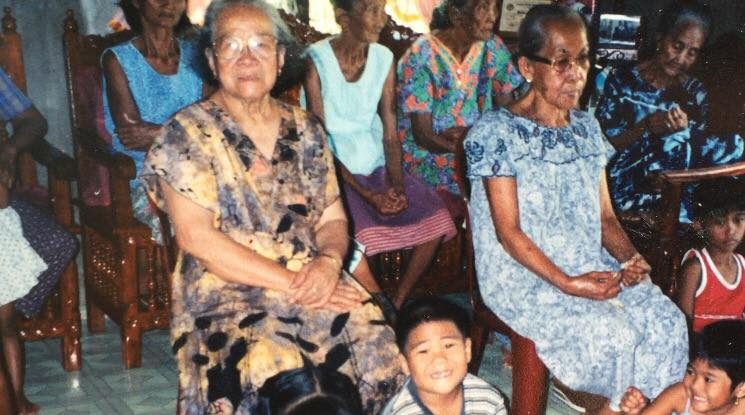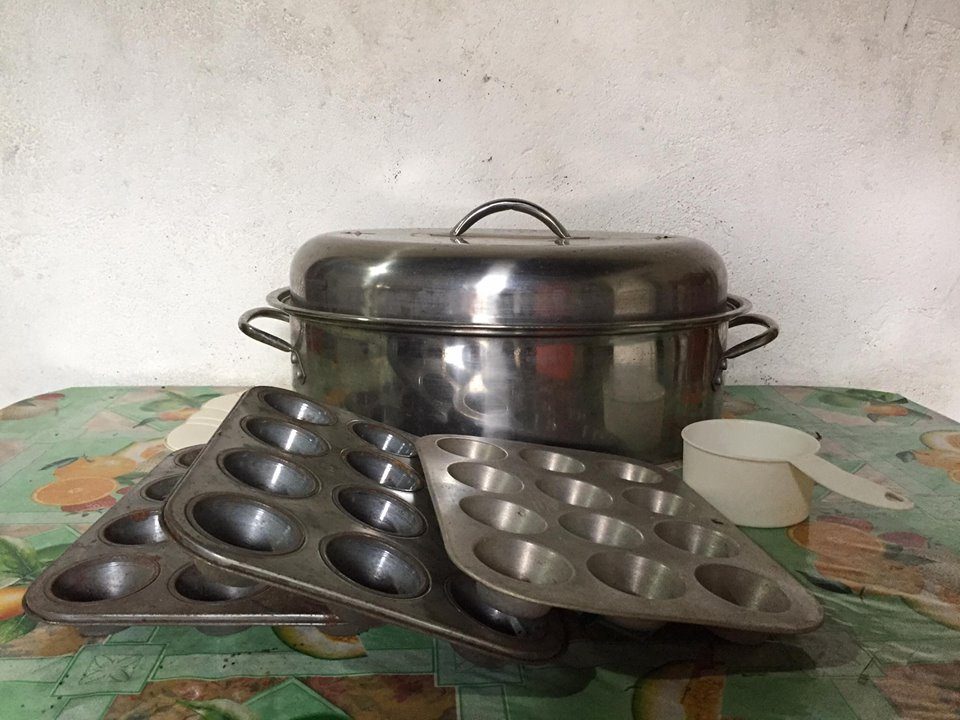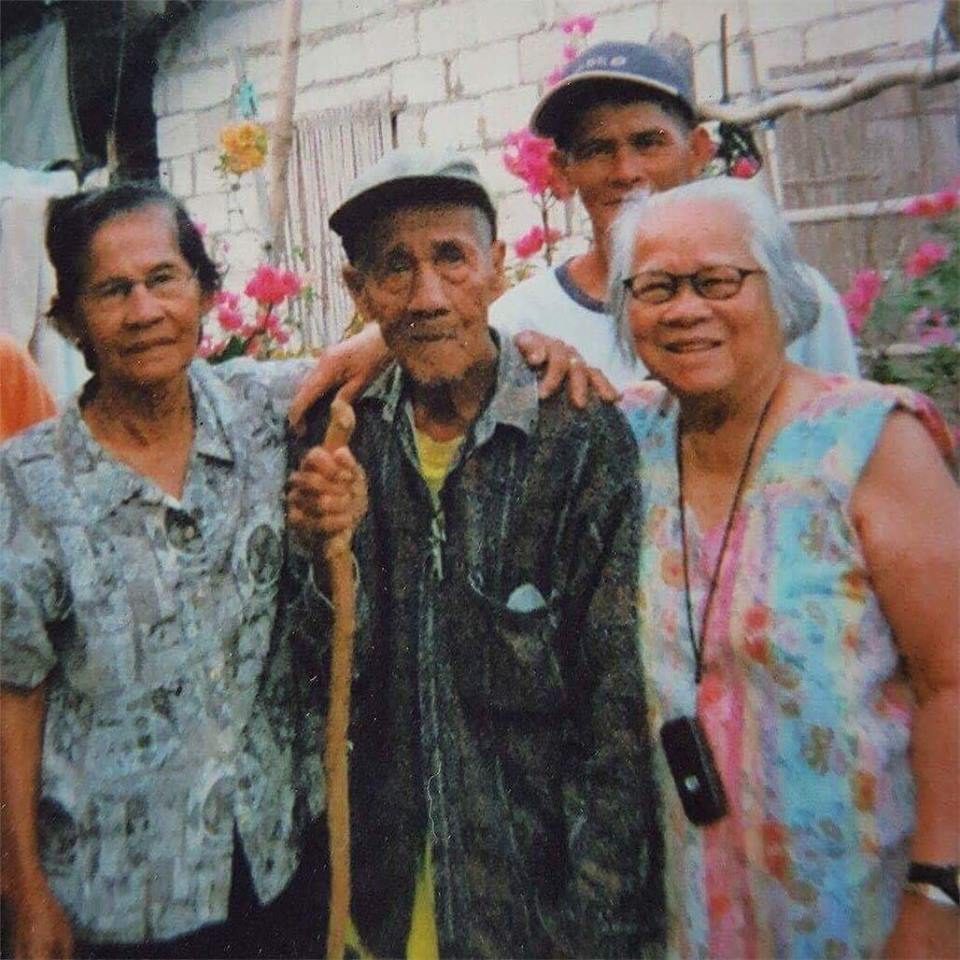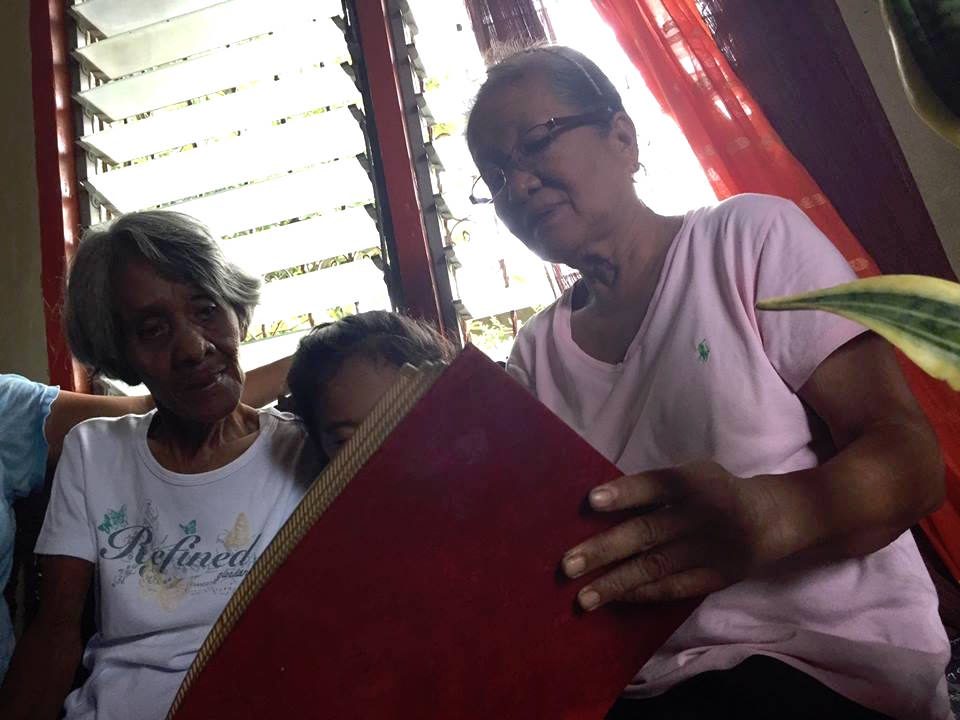SUMMARY
This is AI generated summarization, which may have errors. For context, always refer to the full article.

TARLAC, Philippines – Eudocia Tomas Pulido was set to come home to the Philippines for good in December 2011, or a month before she died after decades of unpaid servitude in the land of the free.
Eudocia, or “Cosiang” to her relatives in Mayantoc, Tarlac, had prepared for her most-awaited and most deserved homecoming, according to her niece 68-year-old Lolita “Ebia” Pulido-Gabertan.
“Impatpatulod na agijay dadduma nga paglutwan tapno nu agawid den, adda paglutwan na, inin-inot nga impatpatulod,” Ebia said in Ilocano. (She sent her baking tools one by one so that when she comes home, she can use them to cook.)
Cosiang stayed with Ebia during her vacations in Mayantoc.
After 68 years of labor in America, 56 of which were unpaid, Cosiang was contented to settle in her relatives’ simple home in Barangay Carabaoan where she wished to revive the old sari-sari store and sell her specialty, puto, or steamed rice cake.
But on November 4, 2011, Ebia received a call from her Aunt Cosiang telling her she was about to undergo a major heart surgery.
“Nagbilin na agpa-doktor ak pay ta siripin da atoy pusok nga agbar-bara kunana, nu injak malasatan, ket maka ammo kayo ditan, kit-kitaem ni tatang mo, an-anusam ni tatang mo,” Ebia said.
(She told me she was going to see the doctor to check blockages in her heart. She said that if she doesn’t survive it, that I should take care of my father, that I should be patient with him.)
Cosiang passed away 3 days after that call. Her baking pans and wooden spatulas are collecting dust in Ebia’s kitchen drawers in Mayantoc. She never got to buy the oven which would have completed her bakery.

Cosiang’s death
Cosiang was virtually a stranger to her family in Mayantoc, having left home when she was 18 years old only to take care of a relative, Leticia Tizon, who the Pulido family knows as Letty.
Her life story was told to the world by the boy she took care of, Letty’s son, the late Pulitzer-award winning journalist Alex Tizon, who confessed through a now iconic memoir that her family had treated Cosiang like a slave.
Cosiang’s relatives did not know this. They barely knew a thing, because of years of cut communication. In fact, they would not even have known she had passed away in November 2011 if Cosiang’s grand niece Emilia Pulido-Lagrimas did not receive a call from someone she knows in the US telling her that their aunt had died.
Cosiang’s death was featured in an obituary in the Seattle Times upon the request of Alex, who had worked for the newspaper as a reporter.
“Pagkasabi sa ‘kin, pinuntahan ko na ang Auntie Ebia ko at sinabi dito na patay na si Lola,” Emilia said. (The moment they told me, I went here to tell Auntie Ebia that Lola is dead.)
Five years after Cosiang’s death, they received another call, this time from Alex himself who informed them he was going to bring home her ashes to Mayantoc. Alex had volunteered to pay for the P35,000 cost of buying a lot at the Eternal Bliss Memorial Park near the town market.
Alex concluded his article describing the feast that followed after he presented Cosiang’s ashes to Ebia and the other relatives: “Ebia sniffled and said it was time to eat. Everybody started filing into the kitchen, puffy-eyed but suddenly lighter and ready to tell stories.” (READ: The Atlantic’s ‘My Family’s Slave’ should not end with a feast)
Ebia said all she can remember of that day is seeing Alex approach their home, appearing empty-handed, and wondering where the ashes were.
“Where’s Lola?” Ebia asked Alex in English.
Alex then removed a tote bag from his shoulders and handed it to Ebia. Ebia said she hadn’t thought to ask why he brought his aunt’s ashes in a bag.
“Dajjay yen, agsasangit kamin a, agdu-dungaw kami latta idin a,” Ebia said. (It was already there, we were already crying, we were all just crying.)
“I…. regretted not buying a real urn, made of porcelain or rosewood. What would Lola’s people think? Not that many were left,” Alex had written for The Atlantic.

5 years late
When Cosiang passed away in 2011, her brother Crispin, Ebia’s father, was still alive. Ebia said they would have wanted for Crispin to have had the chance to bury his sister. But Alex’s return with her ashes in 2016 came too late as Crispin had died in 2013.
Cosiang comes from a brood of 7 – Juliana, Francisca, Crispin, her, Claudio, Gregoria and Maxima. They have different mothers and fathers. Cosiang’s sister from her father, Gregoria, is 99 years old today. She barely remembers the day she buried her younger sister, just that she cried.
“Idi natay yen, nagsangit ak, ngem uray agsangit ak, mapagsublim?” she said. (When she died, I cried. But even if I cry would I be able to bring her back?)
Ebia had asked Alex in 2016 why it took him 5 years to bring home Cosiang’s ashes.
“Kunana met nga insumbat ti english ket ‘nagwala ka ba’ kunanan sa, siyempre nagsakit gamin di ka pay la inyawid nga dagos kunak kanya na, imbaga na met marami daw siyang inaasikaso,” Ebia said.
(He answered in English, something like “were you hysterical”, and I said it hurts because why didn’t you return her ashes immediately, but he told me he was busy.)
“I hadn’t come sooner to deliver Lola’s ashes in part because I wasn’t sure anyone here cared that much about her. I hadn’t expected this kind of grief,” Alex wrote.
There is a connection between Ebia and Alex because when Ebia was 12 years old, she took care of a young Alex in Manila before the Tizon family left for America. (READ: Finding Eudocia Pulido in her hometown in Tarlac)
Tizons’ other maids
Cosiang first worked for the Tizon family in their home in Camiling, Tarlac, after which they moved to Manila with Cosiang in tow. Cosiang’s “alaga” Letty was having kids of her own so they needed more hands.
Ebia, who was only 12, was recruited by her aunt Cosiang to help take care of the Tizon kids. She took care of Alex. But something was wrong: they were not paying her.
When Ebia was told of Alex’s stories about the ill treatment Cosiang got in the hands of his parents, Ebia did not find them hard to believe.
She experienced them first-hand.
“Minsan bumaba kami, karga ko si Alex, hindi ko nabihisan. Dumating yung nanay niya, nakita niya yung damit niya, pinagalitan ako. Lubbo-lubbot, awan short na, sabi ‘umuli kayo!’ Bakit hindi mo siya binihisan at bumaba kayo ng ganyan,” Ebia said.
(One time I was carrying Alex and brought him down from the upper floor, and I hadn’t properly changed him. His mother arrived and saw what he was wearing and she scolded me. His T-shirt had holes and he wasn’t wearing shorts, she told me to bring Alex back up and asked why I brought him down without changing him first.)
There was another instance that she got a dressing down from the Tizons: “May kuneho sila, kinukuhaan ko ng damo sa bakanteng lote. Pero isang araw hindi ako nakakuha kasi nakatulog ako dahil naglalaba kami ni tiyang sa gabi.“
(They had a rabbit which I fed with grass I got from vacant lots around the area. One day I forgot to collect grass because I was sleeping as Aunt Cosiang and I did the laundry at night.)
That was the last straw for the teenager Ebia who had wanted to help her parents in Mayantoc. She put her clothes in a bayong (native bag) and walked to the bus station without any money in her pocket.
“Hindi ka na pinapasuwelduhan, pinapagalitan ka pa, gusto mo bumili ng damit, hindi ka makabili…Suot ko ang tsinelas kong bakya, uwi na ako sabi ko sa tiyahin ko. Naglakad ako sa bus sa Pantranco kahit walang pera. Ang isip ko noon makiusap ako sa driver at konduktor na ibaba ako sa Mayantoc. Hinabol ako ni Tiyang Cosiang at binigyan ako ng pamasahe,” Ebia said.
(They weren’t paying me and they were always scolding me, I wanted to buy clothes but I couldn’t. I was wearing my wooden slippers and I told my aunt I was going to go home. I walked to the Pantranco bus station even though I had no money. My plan was to ask the driver and conductor to just drop me off at Mayantoc. Aunt Cosiang ran after me and gave me money for fare.)
After Ebia, it was her sister, Emilia’s mother, 70-year-old Avelina who followed Cosiang to work for the Tizon family in Manila. She was 16.
Avelina or “Belen” can no longer hear properly and has forgotten a lot of things, said her daughter.
But according to Emilia, her mother had told her that when the Tizon family was set to fly to America, Cosiang’s parents rented a jeepney to Manila to fetch Belen to bring her back to Mayantoc. Alex had written that his father’s sponsor to the US had allowed the family to bring one domestic.
Based on stories in the neighborhood, Cosiang’s father had not allowed her to go but the young Cosiang was persistent because “gusto niyang makaapak sa America (she wanted to set foot in America).”
Looking back now, Ebia and Belen could have been Cosiang. But they left, and she didn’t. We asked Ebia why she thinks Cosiang stuck it out that long.
“Ag-an-anos laeng dajay ngarod inang ni Alex ay kwenta na kasla anak na,” Ebia said. (She was very patient because she treated Alex’s mother like her own daughter.)

Single forever
The first time Cosiang came home to Mayantoc was in 1989, which was also when Emilia got married. The aunt she did not know, who had not talked to them for so long, assumed the role of wedding organizer.
Cosiang assembled Emilia’s entourage for her, she looked for her ninongs and ninangs (godparents). She made sure she had the perfect wedding dress.
“Parang siya ‘yung nanay ko ‘nun (it was as if she was my mother),” Emilia said.
As far as Ebia and Emilia know, Cosiang did not want to get married. The story goes, she had 3 best friends with whom she made a pact never to marry because if they did, they would die.
One of her best friends broke the pact, and then died. Cosiang had then on believed she would suffer the same fate and out of that fear, she decided she wouldn’t marry.
“Adda nag-arem kanya na met idi ngem haan na kayat gamin ket ajay gagayyem na,” Ebia said. (There was one guy she turned away because of the pact with her friends.)
Of course they don’t know if she would have been able to still resist love had she met someone in America, but as Emilia said, “pano siya makakakilala kung hindi siya nakakalabas (how could she have met anyone if she didn’t go out)?”
Besides, according to Ebia, Cosiang already had children – Alex, his kids, his siblings and their kids.
There was just one simple thing she had hoped for, Ebia said.
“Ag for good ditoy, aglako kanu ti iluto na, ta nalaing agluto ket, dagijay tin-tinapay,” Ebia said. (To stay for good here, to sell what she cooks, because she cooks very well, especially pastries.)
And she would have been able to live that dream had she not gotten sick in the later years of her life when she was afflicted both with diabetes and heart ailment, Ebia said.
Because of the amnesty that the Tizon children helped her get, she was finally entitled to benefits in the US and that, Ebia said, was what delayed her longtime plan to return to the Philippines for good.
“Nu ijjay ak amerika, libre agijay agas ko, kunana,” Ebia said. (She said if she stays in America, she would get medicines for free.)
In Alex’s version, Cosiang chose to come back to America because she found that Mayantoc was a strange place to her.
“Everything was not the same,” Alex quoted Cosiang as saying.
Ebia, who sold calamay (sticky rice cake) to raise 4 children, had often told Cosiang to come home and that they would just figure out a way to get by. Because that’s just what Filipinos do – they find a way to get by.
“Napigsa ak pay kunana, isu pay ajay maalak nga social security nu tanu agawid ak, madik may awid ajay social security awan kwarta tayo, an-anusak pay tapno maka-urnong ak bassit,” Ebia said.
(She said she was still strong, that she was after the pension she would get because she would no longer be entitled to that if she comes home, and then we wouldn’t have money here. She said she will endure a few more years so she could earn.)
Alex had written in The Atlantic that when they took Cosiang into their care, they paid her $200 a week. Emilia and Ebia also revealed that Cosiang had worked in a canning factory, although they are unsure of the timeline.
All these don’t add up for Ebia. Had Cosiang earned that much, on top of social pension, why did her aunt say she still needed to earn more to go home?
This is a conflict in the story. Alex claims Cosiang had sent all of her money home to Mayantoc, but her relatives here swear she sent only a few on a couple of occasions.
Ebia also said that when her aunt had shared her plan to renovate the sari-sari store, she asked her aunt to send money ahead so she could start. Cosiang instead said she would just take the money with her in December 2011.
But no point asking where the money is now, said Ebia.
“Patay na si Alex, sino pa ang makakapagsabi kung meron (Alex is gone, who else would be able to say if there was really money),” she said.
They now comfort themselves with the gifts they got from her: a tricycle, a small television set, and a sewing machine.
Question for Alex
Not one from the Tizon family had gotten in touch with the Pulido family in Mayantoc since the article came out in The Atlantic, Ebia and Emilia said. If the Tizons had talked to other relatives based in Manila, they wouldn’t know.
Ebia is unsure whether she would like for one of them to call. At this point, she is inclined to be resigned to the thought that what’s done is done. None of this can take back her aunt’s life.
She has one question for Alex, however: why did he tell the world Cosiang’s story without telling them first?
“Nagsalsaludsod suna, nagpicture-picture suna, dinamag mi nu agaramid istorya na, kunana met wen, haan ko met dinamag idi nu ana,” Ebia said, recalling that in 2016, Alex was already conducting short interviews with relatives.
(He asked us questions, he took photos, so we asked if he was writing a story, he said yes but we didn’t ask what about.)
They never thought the story was going to be like this.
“Bakit hindi niya ipinaalam na ganun pala ang nangyari kay Lola, ginawa pa niyang isulat sa ano article niya….Mas na-appreciate namin sana kung dapat kami ang una niyang pinagsabihan,” Emilia said.
(Why didn’t he tell us that, that’s what happened to Lola, instead he wrote it? We would have appreciated if he told us first.)
Right now, they are focused on one thing: to raise money to exhume the remains of Cosiang’s parents from a public cemetery in Mayantoc and move them to Eternal Bliss so they can be laid to rest beside the child they thought had left them.
It was Cosiang’s dying wish, they said, and they are determined to make that happen because that is the only way to give Cosiang what she had always wanted: a proper homecoming. – Rappler.com
Add a comment
How does this make you feel?





There are no comments yet. Add your comment to start the conversation.